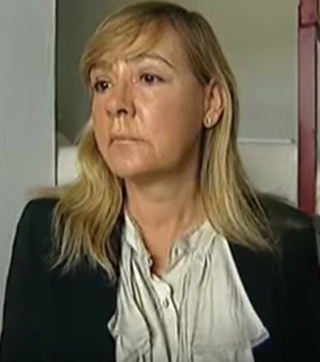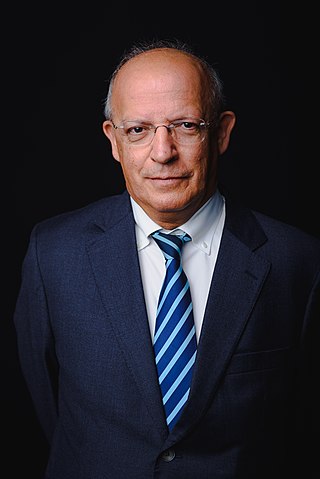José Luandino Vieira is an Angolan writer of short fiction and novels.

Tarrafal was a concentration camp located in the village of Chão Bom, in the Municipality of Tarrafal, on the island of Santiago in Cape Verde.

João Manuel Relvas Leopoldo Botelho is a Portuguese film director.

Henrique Carlos da Mata Galvão was a Portuguese military officer, writer and politician. He was initially a supporter but later become one of the strongest opponents of the Portuguese Estado Novo under António de Oliveira Salazar.
Dundo, or Dundo-Chitato, is a former mining town, with a population of 177,604 (2014), now a city and the provincial capital of Lunda Norte in Angola. Established in the early part of the 20th century as a planned diamond mining community, Dundo has continued to grow, has its own airport and is now being superseded by a new city, New Dundo.

Maria Teresa de Mascarenhas Horta Barros is a Portuguese feminist poet, journalist and activist. She is one of the authors of the book Novas Cartas Portuguesas, together with Maria Isabel Barreno and Maria Velho da Costa. The authors, known as the "Three Marias," were arrested, jailed and prosecuted under Portuguese censorship laws in 1972, during the last years of the Estado Novo dictatorship. The book and their trial inspired protests in Portugal and attracted international attention from European and American women's liberation groups in the years leading up to the Carnation Revolution.

Paula Maria von Hafe Teixeira da Cruz is a Portuguese lawyer and politician. She served as Minister of Justice in the government led by Pedro Passos Coelho from 2011 to 2015.
The Nikkey Shimbun or the Jornal do Nikkey was a Japanese language newspaper published in Liberdade, São Paulo, Brazil. It was one of two Japanese newspapers published in that city, the other being the São Paulo Shimbun. On December 18, 2021, the newspaper printed its last edition.

Maria Isabel Barreno de Faria MartinsGOIH was a Portuguese writer, essayist, journalist and sculptor. She was one of the authors of the book Novas Cartas Portugesas, together with Maria Teresa Horta and Maria Velho da Costa. The authors, known as the "Three Marias," were arrested, jailed and prosecuted under Portuguese censorship laws in 1972, during the last years of the Estado Novo dictatorship. The book and their trial inspired protests in Portugal and attracted international attention from European and American women's liberation groups in the years leading up to the Carnation Revolution.

Augusto Ernesto dos Santos Silva is a Portuguese sociologist, university professor, and politician who served as the President of the Assembly of the Republic between 2022 and 2024, in the 15th Legislature. From November 2015 to March 2022, he was the Portuguese Minister of Foreign Affairs, in the XXI and XXII Constitutional Governments led by Prime Minister António Costa.
The 1961–62 season was Sport Lisboa e Benfica's 58th season in existence and the club's 28th consecutive season in the top flight of Portuguese football, covering the period from 1 August 1961 to 31 July 1962. Benfica competed domestically in the Primeira Divisão and Taça de Portugal, and participated in the European Cup after winning the competition in the previous season. As the reigning European Cup holders, they represented the continent in the Intercontinental Cup.

Virgínia Sofia Guerra Quaresma was the first woman to take up professional journalism in Portugal and was one of the first women graduates from the Faculty of Arts of the University of Lisbon. She was openly lesbian, in a time when society dictated that sexual orientation be hidden, and a feminist, who advocated for full equality between men and women. In her coverage of a sensational murder case in Brazil, she brought the issue of violence against women to the forefront. In the 1930s, she relocated permanently to Brazil, but traveled internationally with her work. A street was renamed in her honor in the Belém neighborhood of Lisbon, and in 2010, she was honored with a stamp bearing her likeness, along with other women.
Artur Manuel de Oliveira Rodrigues Albarran was a Portuguese journalist and entrepreneur.
The Diário de Lisboa was a daily evening newspaper published in the Portuguese capital of Lisbon between 1921 and 1990.
Associação Brasileira de Jornalismo Investigativo is an organization for Brazilian Journalists wanting to exchange information, experiences, and tips about investigative journalism. They are a non-profit association maintained by the journalists themselves. Some of their goals include: holding congresses, seminars, and specialized workshops; taking care of the professional improvement of journalists; publishing books on the subject; and hosting forums for exchanging experiences.
Maria Lúcia Amaral is a Portuguese lawyer, university professor, politician and judge. She was vice-president of the Constitutional Court of Portugal and is Portugal's 10th Ombudsman, being the first woman to hold this post.

Osvaldo Moles was a Brazilian journalist, and radio announcer. He made important contributions the Brazilian radio, journalism, literature, and cinema.
Events in the year 2024 in Portugal.

Ruy Alberto Vieira Dias Rodrigues Mingas was an Angolan singer, songwriter, diplomat, businessman and politician. He was a deputy in the National Assembly, secretary with the status of Minister of Sports and ambassador of Angola to Portugal. He composed the music for Angola Avante, the national anthem of Angola.
The Dundo Museum, officially the Dundo Regional Museum and formerly called the Dungo Ethnographic Museum, is a national ethnographic and natural history museum in Dundo, Lunda Norte Province, Angola. It was founded in 1936 by the Diamang company, making it the country's first museum. It is considered one of the country's most important museums and one of the most important cultural museums in Africa. It focuses primarily on preserving artifacts related to the heritage and culture of eastern Angolan groups, particularly the Chokwe people, and also has natural history and archaeological collections. Several objects were looted during the Angolan Civil War and repatriation efforts are ongoing. On 18 April 2016, it was named a regional cultural reference monument.










